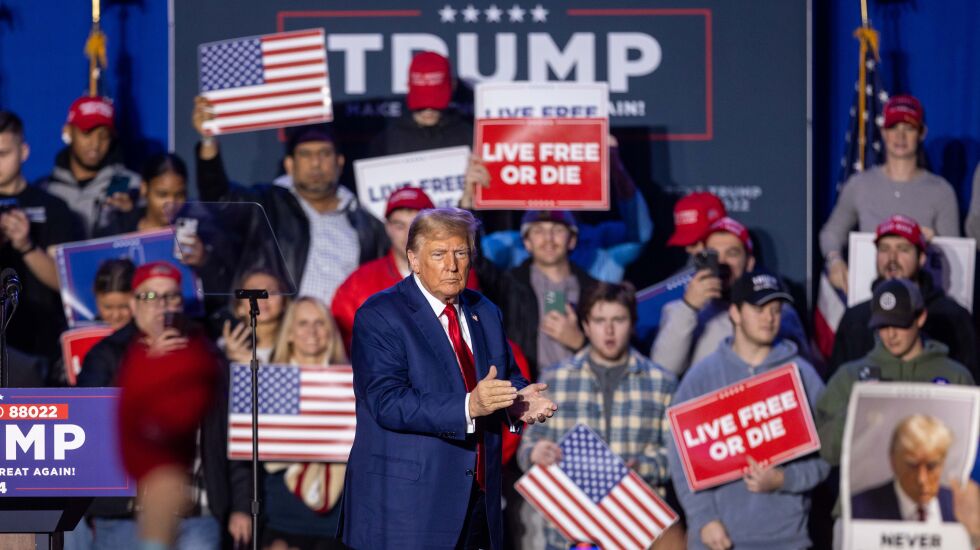
Donald Trump’s MAGA movement is fundamentalist at its core — with fundamentalism being understood as a psychological rather than a religious concept.
Pretty much every large-scale public movement, secular or sacred, has its share of extremists, and as the religious columnist Paul Prather has argued: “Remove the labels, close your eyes and quickly the fundamentalists in one group start sounding uncannily like the fundamentalists in all other groups, as if they were reading from the same script.”
It’s another word for fanatic.
Most Trumpists call themselves “conservative,” which used to signify a belief in limited government, low taxes, free trade and freedom of conscience but which under Trump signals tribal loyalty and revenge.
This explains what some see as the central paradox of the MAGA movement: that a congenital braggart who embodies what Christianity has traditionally called the seven deadly sins — greed, lust, envy, sloth, gluttony, pride and wrath — has come to seem the totem of faith for millions of Republican evangelicals.
Trump spent Christmas Day typing up and posting laments and threats in ALL CAPS on his Truth Social, targeting “JOE BIDEN’S MISFITS & THUGS, LIKE DERANGED JACK SMITH.” They’re “COMING AFTER ME,” he warned, “AT LEVELS OF PERSECUTION NEVER SEEN BEFORE IN OUR COUNTRY??? ... looking to destroy our once great USA. MAY THEY ROT IN HELL. AGAIN, MERRY CHRISTMAS!”
A bit lacking in the spirit of the holiday, some would say.
Not to mention he’s the world’s biggest crybaby.
But they would be wrong, the MAGA faithful would insist. George Orwell captured the essence of the whiny strongman in reviewing the British edition of Adolf Hitler’s “Mein Kampf” way back in 1940, after the German dictator had driven Germany to war, but before it was clear he had doomed his country to catastrophe.
Hitler, Orwell wrote, “knows that human beings don’t only want comfort, safety, [and] short working-hours ... they also, at least intermittently, want struggle and self-sacrifice, not to mention drums, flags and loyalty-parades.”
Orwell understood fascism’s appeal to an aggrieved population. While European and North American democracies, he wrote, told people in effect that “‘I offer you a good time,’ Hitler has said to them, ‘I offer you struggle, danger and death,’ and as a result a whole nation flings itself at his feet.”
Orwell also understood the personal psychology of the crybaby conqueror: “The initial, personal cause of [Hitler’s] grievance against the universe can only be guessed at; but at any rate the grievance is here. He is the martyr, the victim, Prometheus chained to the rock, the self-sacrificing hero who fights single-handed against impossible odds. If he were killing a mouse he would know how to make it seem like a dragon.”
Sound like anybody we know?
That said, I do believe Trump when he says he never read “Mein Kampf.” Too long, too many big words. Trump never learned anything from a book. He stole his whole act from 1950s professional wrestlers at Sunnyside Gardens in Queens, specifically from Dr. Jerry Graham, who swaggered around boasting that “I have the body men fear and women adore.”
The hairstyle, too — a bleached blond pompadour that taught a generation of wrestling fans how a “heel” behaved — that is, basically like a cartoon Nazi. Graham was a masterful showman who aroused thousands to frenzy with balsa wood chairs and fake blood capsules. He was as fat as Trump, too, although there was muscle under the lard.
Likewise, Trump needed no books to absorb the lesson that nonwhite immigrants are “vermin” poisoning the nation’s blood, or that (white) people in Minnesota, as he assured an audience there the other day, are genetically superior.
He learned those things at his slumlord father’s knee. Fred Trump was arrested at a Ku Klux Klan march through Queens some years before The Donald was born. This business about racehorse genes is straight KKK dogma. It’s always appealed to people who fear outsiders.
But back to the great man’s hypnotized fanbase. Prather credits David French with defining fundamentalism’s essential nature. French argues that whether religious or political, all fundamentalist cultures exhibit “three key traits: certainty, ferocity and solidarity.” He says certainty is the key to the other two traits.
“The fundamentalist mind isn’t clouded by doubt,” French has written. “In fact, when people are fully captured by the fundamentalist mind-set, they often can’t even conceive of good-faith disagreement. To fundamentalists, their opponents aren’t just wrong but evil. Critics are derided as weak or cowards or grifters. Only a grave moral defect can explain the failure to agree.”
Doubters should see this column’s e-mail feed, although I must say the Trumpist faction has been relatively restrained of late. Maybe they’ve given up on me or maybe reality has begun to creep in at the edges.
One way or another, fundamentalist cults always implode, often violently, but sometimes not.
Gene Lyons is a National Magazine Award winner and co-author of “The Hunting of the President.”
Send letters to letters@suntimes.com







